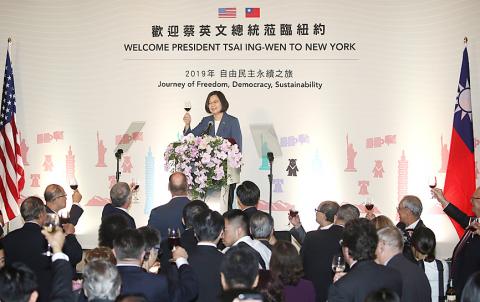President Tsai Ing-wen (蔡英文) on Friday night appeared before more than 1,000 supporters in Manhattan, New York City, touting Taiwan as a bastion of democracy while warning that freedoms around the world are under threat like never before.
“It is absolutely crucial for democracies to work together to counter the expansion of authoritarian influences,” Tsai told a packed house at the Grand Hyatt New York, without mentioning China by name.
“We cannot take Taiwan’s hard-earned freedom and democracy for granted,” she said.

Photo: CNA
Tsai’s first-ever transit through New York as president, part of a larger 12-day journey to the nation’s four Caribbean diplomatic allies, sparked anger and outrage from China, which urged the US government not to allow it.
Pro-Beijing protesters turned out by the hundreds on Thursday and Friday to rally outside the hotel near Manhattan’s iconic Grand Central Station.
Penned in by New York Police Department barricades, demonstrators held aloft a panoply of handmade signs, including ones that read: “Oppose Taiwanese independence” (反對台獨) and “Taiwan is China’s” (台灣是中國的).
At one point, they also blasted the Chinese national anthem on loudspeakers as they waved US and Chinese flags, a scene that stopped vehicles and pedestrians in their tracks.
Speaking in English, as well as in Mandarin and Hoklo (commonly known as Taiwanese), Tsai told the roughly 1,070 banquet attendees that Taiwan and New York are more alike than people think.
“We both take pride in our progressive society, openness to new ideas and tolerance for different opinions — like the noise outside of this hotel,” she said, referring to the pro-Beijing protests, a remark that drew both laughter and applause.
Tsai’s trip, dubbed the “Journey of Freedom, Democracy and Sustainability,” is to take her to Haiti, Saint Kitts and Nevis, Saint Vincent and the Grenadines, and Saint Lucia, four of Taiwan’s 17 remaining diplomatic allies.
Democratic and Republican members of the US Congress who attended the event spoke of their strong support for Taiwan.
They mentioned a US$2.2 billion possible weapons sale to Taiwan approved this week by the US Department of State and the US’ Taiwan Travel Act, signed into law last year by US President Donald Trump.
The act allows senior US officials to travel to Taiwan and vice-versa.
“We’re standing together to face a growing threat,” said Republican US Representative Michael McCaul, a ranking member on the US House of Representatives Foreign Affairs Committee. “China threatens our shared security, our values and our system of government.”
Earlier in the day, Tsai attended a Taiwan-US business summit and participated in a panel discussion at Columbia University.
On Thursday, she visited the Taipei Economic and Cultural Office in New York, the nation’s de facto embassy, and met with a group of permanent representatives to the UN from nations that have diplomatic relations with Taiwan.
Before heading home, Tsai is to stop in Denver, Colorado, also for two days. There, she is expected to meet with reporters at an informal gathering to share the results of her visits.
Tsai is scheduled to return home on July 22.

Alain Robert, known as the "French Spider-Man," praised Alex Honnold as exceptionally well-prepared after the US climber completed a free solo ascent of Taipei 101 yesterday. Robert said Honnold's ascent of the 508m-tall skyscraper in just more than one-and-a-half hours without using safety ropes or equipment was a remarkable achievement. "This is my life," he said in an interview conducted in French, adding that he liked the feeling of being "on the edge of danger." The 63-year-old Frenchman climbed Taipei 101 using ropes in December 2004, taking about four hours to reach the top. On a one-to-10 scale of difficulty, Robert said Taipei 101

Taiwanese and US defense groups are collaborating to introduce deployable, semi-autonomous manufacturing systems for drones and components in a boost to the nation’s supply chain resilience. Taiwan’s G-Tech Optroelectronics Corp subsidiary GTOC and the US’ Aerkomm Inc on Friday announced an agreement with fellow US-based Firestorm Lab to adopt the latter’s xCell, a technology featuring 3D printers fitted in 6.1m container units. The systems enable aerial platforms and parts to be produced in high volumes from dispersed nodes capable of rapid redeployment, to minimize the risk of enemy strikes and to meet field requirements, they said. Firestorm chief technology officer Ian Muceus said

MORE FALL: An investigation into one of Xi’s key cronies, part of a broader ‘anti-corruption’ drive, indicates that he might have a deep distrust in the military, an expert said China’s latest military purge underscores systemic risks in its shift from collective leadership to sole rule under Chinese President Xi Jinping (習近平), and could disrupt its chain of command and military capabilities, a national security official said yesterday. If decisionmaking within the Chinese Communist Party has become “irrational” under one-man rule, the Taiwan Strait and the regional situation must be approached with extreme caution, given unforeseen risks, they added. The anonymous official made the remarks as China’s Central Military Commission Vice Chairman Zhang Youxia (張又俠) and Joint Staff Department Chief of Staff Liu Zhenli (劉振立) were reportedly being investigated for suspected “serious

American climber Alex Honnold is to attempt a free climb of Taipei 101 today at 9am, with traffic closures around the skyscraper. To accommodate the climb attempt and filming, the Taipei Department of Transportation said traffic controls would be enforced around the Taipei 101 area. If weather conditions delay the climb, the restrictions would be pushed back to tomorrow. Traffic controls would be in place today from 7am to 11am around the Taipei 101 area, the department said. Songzhi Road would be fully closed in both directions between Songlian Road and Xinyi Road Sec 5, it said, adding that bidirectional traffic controls would